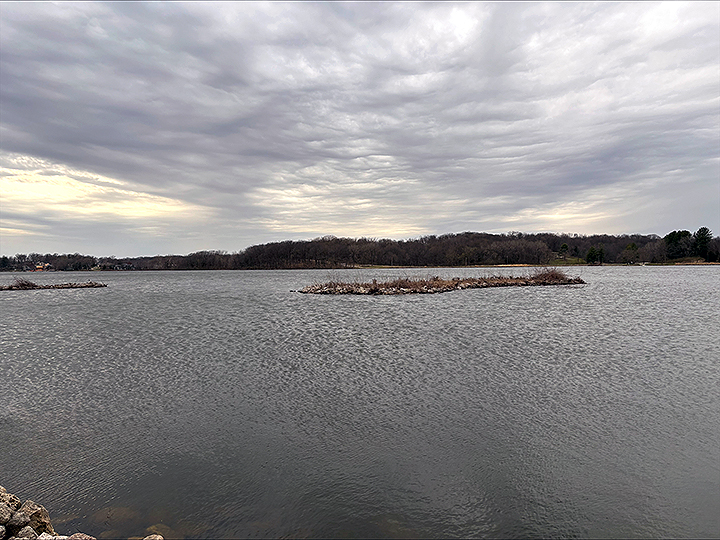
Cami Rasmussen has been around lakes her entire life. So when she stood at the entrance to Lake Macbride on Feb. 8, watching emergency responders drive into the state park, she knew there had been a drowning.
And she was heartbroken.
Only broken ice and a pair of gloves remained on the icy surface where Jack Peacock, 85, of Cedar Rapids, had fallen through while fishing.
Emergency personnel found his body in the water. Then Solon firefighters, this time in ice rescue suits, removed Peacock, and an ambulance transported him to the University of Iowa Hospitals and Clinics, where he was declared dead.
Siren after siren, vehicle after vehicle — each unable to save his life.
“Whenever we saw the emergency vehicles headed toward the lake [when I was growing up], it was always a catch in your breath like, ‘Oh, I hope it’s not a drowning,’” said Rasmussen, the Solon city administrator. “And unfortunately, that day [in February], it was.”
Drownings aren’t frequent, but several people have drowned in Eastern Iowa in the last year. A Marion man died Feb. 27 after he and two others fell through ice on the Cedar River in Linn County. And a 20-year-old swimmer from Iowa City drowned in Lake Macbride on July 31.
Such occurrences shine light on the need for water safety in Johnson County, officials said. And with the summer months of warm weather and clear days approaching quickly, that need is even greater as residents use Lake MacBride and the Coralville Lake.
Living in a lake community
Altogether, 6,172 boats are registered to residents of Johnson County, according to Iowa Department of Natural Resources records obtained through an open records request. And 279 Solon residents have fishing licenses, bringing them on or near the water every year, the DNR reported.
Rasmussen considers Solon a “lake community,” and she emphasized the need for education, discussion, and constant examination of what the city can do better for water safety. But she doesn’t have a clear answer to how exactly it can better protect its citizens.
“Our park rangers do a really good job of posting information,” she said. “And that broader responsibility of Solon as a neighbor is a difficult one to determine what we could do to reduce risk or improve safety.”
Solon has 35 volunteer firefighters extensively trained to be emergency first responders, including to water-related incidents, Rasmussen said. In addition to work like the Feb. 8 rescue, Solon first responders actively support the DNR and Lake Macbride park rangers in emergency response.
“To be able to react … even during a stressful and an emotional situation, and then … go home, take care of your family, go to work — you don’t leave those events at the firehouse,” Rasmussen said. “They stay with you. It takes a special person to be able to face these situations where people’s lives are in danger.”
“I think we have some of the best here,” she added.
Life jackets and sober drivers
The Johnson County Sheriff’s Office also responds to incidents on Lake Macbride and around Coralville Lake.
The office has mainly responded to drownings, accidental fallings, and flipped kayaks since 2020, two of such incidents notably including individuals without a life jacket on — which concerns Johnson County Sheriff Brad Kunkel.
“Time and time again, that’s the key piece,” Kunkel said. “Any time we have a drowning-related death, more often than not, people aren’t wearing life jackets. Life jackets save lives.”
Kunkel said water patrols for enforcement of safety regulations take a big chunk of deputies’ time in the summer, aimed primarily at intoxicated boating.
“Intoxicated boating kills people,” Kunkel said. “Any warm weekend on the Coralville Reservoir, or Lake Macbride for that matter, is very, very busy … The more boats you have, the more people that are out on the water enjoying those resources. There’s a lot that can go wrong.”
Erika Billerbeck, conservation officer sergeant in the Law Enforcement Bureau of the Iowa DNR, said many boating and drowning incidents in the summer involve alcohol.
Billerbeck and the DNR spend their summers patrolling for speeding boats or alcohol impairment, stopping boats like a trooper stopping cars on a highway.
Having a sober boat driver is key, she said.
“Think about in a car — if you’re going out to a bar, it’s the same thing, except people for some reason don’t think that way,” Billerbeck said. “When they’re going out in a boat, they think it’s OK for everybody to be drinking. Obviously, it’s not always best to have the driver drinking.”
But above all else, Billerbeck emphasized the need for boaters to be aware of their surroundings.
“When they’re out on the lake or when they’re out on the reservoir, [it’s] being aware that other drivers may not know what they’re doing operating boats,” she said. “So just be very cautious.”